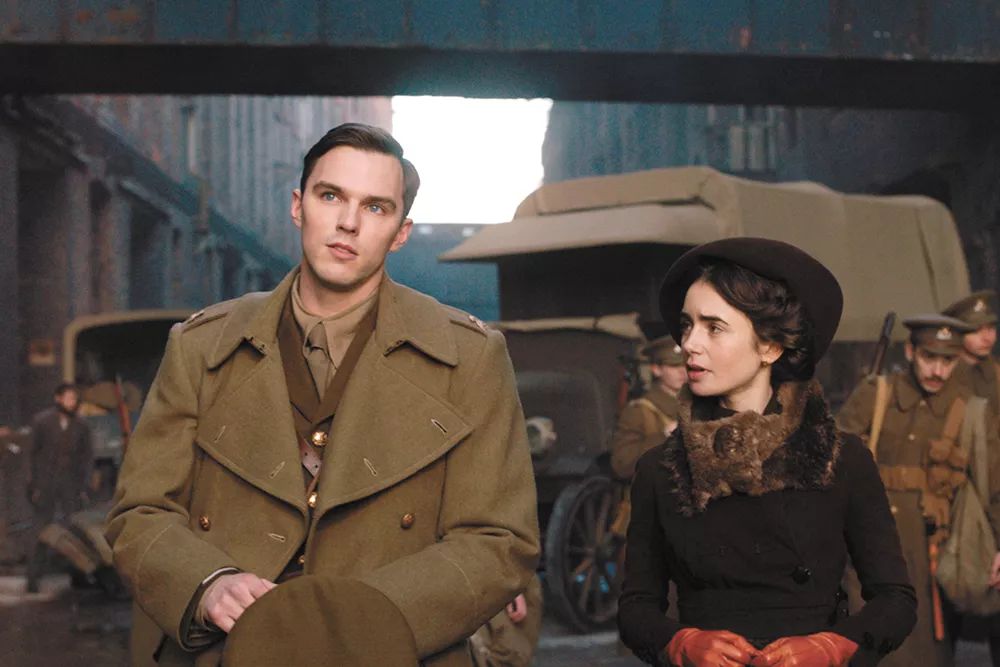It's nerdy thought experiment time. Which movie would be easier to follow for a tabula rasa individual with no knowledge of Marvel or Middle Earth: The world-eating blockbuster that is Avengers: Endgame, or Tolkien, the new biopic about the young life of The Hobbit and Lord of the Rings author J.R.R. Tolkien?
While on the surface it may seem like a silly question — what with the Marvel Cinematic Universe's 11-year, 22-film cast of dozens of characters — Tolkien is essentially a series of "do you see how something you know from Lord of the Rings is actually a direct allegory to an event that really happened to J.R.R.?" moments. If a viewer isn't familiar with the books that the protagonist will go on to write, then Tolkien would seem like a tale of an arty World War I vet who suffered from hallucinations. The film's structure and performances are sturdy enough, but the background knowledge is essential.
The story begins in French trenches during WWI, as Tolkien (Nicholas Hoult) embarks on a journey to find his old friend Geoffrey, who hasn't been heard from in weeks. He's accompanied, much to his own reluctance, by one of his soldier pals, Sam (Craig Roberts), who cares for an ailing Tolkien on their prolonged quest. If you're familiar with Lord of the Rings, it's incredibly on-the-nose, nudge-nudge, do-you-get-it parallel storytelling, and the film continually cuts back to this flash-forward thread while exploring Tolkien's younger days.
The main thread follows Tolkien's challenging upbringing, which began with moving from the Shire-like English countryside to the Mordor-esque industrial darkness of Birmingham after his father died, only for his mother to die young as well, leaving he and his brother orphaned (though, oddly her death is blown past without explanation, and the brother plays no role in the story). Under the custody of a Catholic priest, the boys are placed into a boarding house, and Tolkien gets sent to the fancy King Edward's School. Despite being the poor child at the aristocratic institution, he soon falls in with three other boys — Geoffrey, Rob and Christopher — and their shared aspiration to create art leads them to form a secret tea society. A fellowship, if you will. It's also in the boarding house where Tolkien meets fellow orphan and soon-to-be love of his life, the enchanting Edith Bratt (Lily Collins).
Finnish director Dome Karukoski handles Tolkien as a relatively straightforward biographic period piece. Apart from the Middle Earth-hinting hallucinations on the French battlefield — which make for striking visuals, with fatal bullet wounds being orcs' blades and poison gas billowing into the form of the Witch-king of Angmar — there's not much flash to the cinematography, but everything goes down with smooth believability.
The continually excellent Hoult gets the most out of a man who mostly lived on the level, injecting moments of pathos like when his jealousy spikes watching Edith engage in stirring conversation with Rob about Wagner's Ring cycle. It's a Golem-esque moment of Tolkien treating Edith like his precious possession, which unfortunately is a bit like how the film treats her. While Collins plays Edith as a near intellectual equal to Tolkien, the narrative essentially turns her into an almost mythical creature — an elven princess — that only exists to love (or not love) him.
The overall execution of Tolkien is solid and hits on the emotional notes you'd expect from wartime brutality, but its appeal is pretty limited beyond the author's legions of devotees. Cinema whose primary existence is "let's spell out the allegories of more popular movies/books" can't help but feel a bit hollow in the end. ♦

